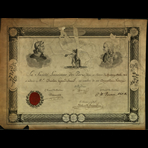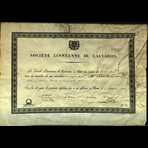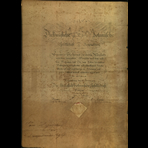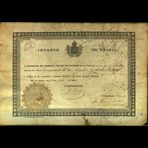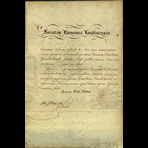Acknowledgments Charles Gaudichaud Beaupré click on the thumbnail to view full-size image
Those five recognitions from different Linnaean, medical and botanical societies shown here are part of the private archive of one of the greatest French wise men and botanical collector of the XIX century, “Charles Gaudichaud Beaupré” which enrich the scientific heritage of this magnificent and unique collection that sums up his entire career as a researcher of the vegetal life.
All these objects which were casually discovered 15 years ago consisting in books, letters, engravings, maps, drawings and personal notes, have been completely organized and classified during a period of twelve years of exhaustive investigation as a legacy for the global science.
Fernando Wamprechts.
BIOGRAPHY OF CHARLES GAUDICHAUD BEAUPRÉ.
Born in Angouleme on the 4th of September 1789
Died in Paris on the 16th of January 1854.
Gaudichaud, C. Groups: ABMPS. Organisations: B, BM, BR, DS, F, FI, G, G-DC, K, L, MO, MPU, P, PC, P-JU, US, W. Collected: (1817-1837) Chinese region: China (Guangdong), Macau; Indian region: India; Indo-China: Viet Nam; Malesian region: Indonesia (Maluku, Nusa Tenggara Timur), Malaysia (Penang), Papua New Guinea, Philippines, Singapore; West African Islands: Canary Islands; Southern Africa: South Africa; Southern African Islands: Saint Helena; Madagascan region: Madagascar; Mascarenes: Mauritius, Reunion; Australian region: Australia; Polynesia: Mariana Islands (Northern), Micronesia (Caroline Islands); North America: USA (Hawaii); Tropical South America: Bolivia, Colombia, Peru (Callao, Puno); Brazilian region: Brazil (Rio de Janeiro); Temperate South America: Argentina, Chile (Valparaíso), Falkland Islands, Uruguay (Montevideo).
Associates: Arago, J.E.V. (1799-1855) (co-collector), Beaupré, C.G. (synonym), Duperrey, L.-I. (1786-1865), d'Urville, J.S.C.D. (1790-1842) (co-collectors), Freycinet, L.-C. de S. de (1779-1842) (captain), Gaimard, J.-P. (1790-1858) (co-collector), Gaudichaud, C., Gaudichaud-Beaupré, C. (synonyms), Guichenot, A. (fl.1800-1820), Lesson, A.P.P. (1805-1888), Paul, Joseph (fl.1817) (co-collectors), Pervillé, A. (-c. 1868) (specimens from), Quoy, J.R.C. (1790-1869) (co-collector), Richard, J.M.C. (1784-1868) (specimens from). 2:220, 9:170, 11:165, 18:190, 19:25, 22:63, 23:208, 23:219, 34:654.
French pharmacist and botanist who participated in a number of major expeditions including the circumnavigation (1817-1820) led by Louis-Claude de Saulces de Freycinet (1779-1842). The expedition in the corvette L'Uranie was curtailed by a shipwreck (14 February 1820) on the Iles Malouines when they attempted to reach the abandoned French settlement of Port Louis. This small colony had been established in 1763 by the first French circumnavigator, Louis-Antoine de Bougainville (1729-1811), on what he had named the Iles Malouines as most of his colonists were from St Malo. The British, who had landed there as early as 1688, retook the colony in 1764 and named the island group the Falkland Islands.
In the shipwreck of L'Uranie, several cases of specimens from the earlier part of the expedition were lost but some natural history material was salvaged, particularly from the physical sciences. Gaudichaud-Beaupré made new collections while Freycinet completed his preparations to continue the voyage. A replacement ship was fortuitously located from an American whaler named Captain Orne, who was flying the rebel flag and who anchored on the island on his way to transport cannon to Valparaíso. Freycinet negotiated use if his whaling ship, the General Knox, for completing the expedition and it was renamed La Physicienne.
The Scottish Antarctic explorer James Weddell was also on the island at that time but news of the shipwreck was kept from him until after the negotiations had been concluded. He wrote of his meeting with Freycinet and his young wife Rose de Saulces de Freycinet who was illicitly on board and who wrote a fascinating journal of the expedition.
Gaudichaud-Beaupré sailed again on the third round the world voyage of the Bonite (1835-1837). He visited Perrottet in India at Pondicherry and J.M.C. Richard in the Mascarenes. He was given the gift of a collection from Madagascar made by A. Pervillé, the earliest botanical collector of Madagascar. Specimens attributed to Gaudichaud-Beaupré from Madagascar are probably all referable to Pervillé or perhaps J.M.C. Richard. After completing his expeditions Gaudichaud-Beaupré was given the post of Professor of Pharmacy in Paris and was attached to the Muséum National d'Histoire Naturelle (P), where he worked on his botanical collections until he died.
www.sil.si.edu/digitalcollections/hst/scientific-identity/CF/display_results.cfm?alpha_sort=P
gallica.bnf.fr/ark:/12148/bpt6k99354r.pdf
top


